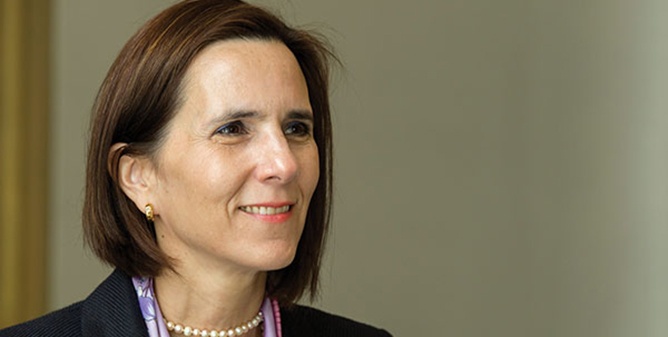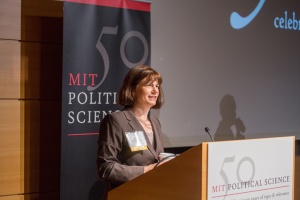ALUMNI SPOTLIGHT 3 Questions: Dr. Lourdes Melgar, PhD '92
Pioneering Energy Reformer and Political Science Graduate

Dr. Lourdes Melgar, PhD '92, Mexico’s Deputy Secretary of Energy for Hydrocarbons
Photo courtesy of Dr. Lourdes Melgar
In November 2015, MIT’s Department of Political Science celebrated its 50th anniversary, marking a half century of “rigor and relevance.” In tribute to our alumni who have made the department the successful and diverse community that it is today, the department is highlighting three alumni who joined us for the celebration.
Dr. Lourdes Melgar, PhD ’92, currently Mexico’s Deputy Secretary of Energy for Hydrocarbons, is a veteran of various high-level positions in the Mexican government and the recipient of numerous awards for her work in energy policy, including the 2012 Achievement on Energy Award for her academic and scientific accomplishments, from Petroleo&Energía.
Q: In your career, you have worked on a wide range of issues, including efforts to stabilize the international oil market, negotiate the first trans-boundary treaty with the United States, and foster North American energy relations. What aspects of your career — on these, or any other initiatives — have you found most satisfying, and why?
Throughout my career in public office, I have had the privilege of participating in highly relevant policy making initiatives aimed at furthering the national interest of Mexico. Bringing a vision, defined through scholarly work, into policies I get to design and implement is highly rewarding. I feel most satisfied when I sense that the work I’ve done has contributed to improving conditions and opportunities for present and future generations of Mexicans.
Mexico’s Energy Reform is a case in point. Our country is undergoing a profound transformation regarding the way we source, produce, and use energy. The drafting of our new energy model demanded — and continues to demand — the understanding of highly complex issues, ranging from specific technical concepts to a deep knowledge of our political norms and social needs. Our objective is to ensure that public policies, regulations, and legal instruments we design truly contribute to Mexico’s sustainable development.
For over a decade, I studied, thought, and wrote about the needed transformation of Mexico’s energy sector. Since the beginning of the Peña Nieto administration, I have been part of the team that took on this historic challenge. Never before had a country undertaken such a revolution, modernizing simultaneously its hydrocarbons and electricity sectors, and implementing reforms soundly in record time.
I am grateful for the honor vested in me to lead some of the initiatives that are transforming my country. Having completed a PhD at MIT provided me with the analytical tools, knowledge, confidence, and humility to undertake such an endeavor.
Q: The MIT approach to both research and education is to combine the STEM fields with the humanities, arts, and social sciences. As someone with a PhD in a social science field, who serves as a Deputy Secretary of Energy for Mexico, your career in public life perfectly embodies that combination. How did your education at MIT guide your unique path? How did the humanities, arts, and/or social science classes in your education help give you perspectives, skills, or capacities for your career in public life?
MIT is an extraordinary place that prepares graduates to tackle complex issues from a multi-disciplinary perspective. I am convinced that MIT Political Science is the only department where I could have written a dissertation which required understanding engineering principles, political economy, cultural politics, business organization, and history.
At MIT, I had the opportunity to interact with extraordinary people who were incredibly bright, but also at the core nice and generous. I still recall a day when walking down the Infinite Corridor I ran into an elderly professor who invited me to visit his photo exhibit. It turned out to be Harold “Doc” Edgerton. I was as mesmerized by his simplicity as by his talent. At MIT, the wisest people were the most humble. There were Nobel prizes and “genius” award recipients from a wide variety of fields who would gladly share a conversation with young minds about sophisticated theories or simply about life.
At MIT I learned that one should never be afraid of asking questions. Knowledge is never ending. I also learned not to be intimidated by complexity, but to look at it with curiosity. At MIT I learned as much from truly living the Institute experience as I did in the classroom. At the time, I was not fully aware of that, but now I know that being constantly exposed to cutting-edge research in sciences and technology made me feel at ease with subjects and concepts that were not part of my formal education. Perhaps this explains why I feel as comfortable as a policy maker in the energy field and why I am passionate about it.
Q: The environment, particularly issues involving water and food, is a central focus of research at MIT. From your perspective as a policymaker, how does such research — including social science scholarship — aid and inform your approach to energy policy?
Sustainability is a key principle guiding my definition of energy policy. As Founding Director of the Center for Sustainability and Business at EGADE Business School in Mexico, I benefitted greatly from the interaction with colleagues at MIT Political Science and the Sloan School who are doing cutting-edge research on sustainability. Their generous advice and collaboration helped shape a sound program that educates new generations of MBA students in Mexico with awareness on climate change and sustainability concerns.
MIT has been a source of knowledge I return to in order to enrich my thinking and policy design. I have benefitted from professional education courses and from the research generated by the MIT Energy Initiative (MITei). I also value deeply the C3E (Clean Energy Education & Empowerment) Women in Energy initiative, launched by MITei and the U.S. Department of Energy, and for which I have been appointed Mexico C3E Ambassador, with the aim of serving as a role model and advocate for women in clean energy.
Throughout my life, MIT has been a quintessential source of information, based on solid scientific foundations and a multidisciplinary approach, to develop a better understanding regarding the complexities of addressing current global challenges, such as climate change, water scarcity, and increasing energy demand.
